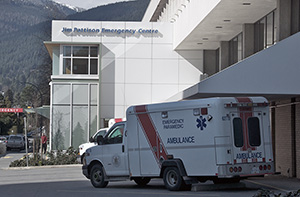Due to the proximity to the mountains and outdoors as well as the vast catchment area the MOCSM surgeons perform approximately 1500 trauma surgical procedures per year. As a result of the high volume of complex cases, we have approximately 45 hours of scheduled daytime operating time set aside for trauma surgery each week. We do the best we can to get surgery done for patients as soon as possible but there are times we are so busy that patients may have to wait several days for surgery. Each patient is prioritized based on need and no one’s end result will be affected by any delay. Some patients need to be hospitalized before and after surgery but many patients can be managed from home.
Outpatient Surgery Guidelines
Relatively minor injuries that require surgery can often be managed from home. This means you will be sent home from the emergency department while you await surgery. At MOCSM we manage many patients this way. Often patients will have met one of the orthopedic surgeons after the injury in the Emergency Department or Cast Clinic. However, due to the size of the catchment area of Lions Gate Hospital for orthopedic trauma, patients are often placed on the list for trauma surgery after a phone consultation between the emergency physician (or family physician) and the orthopedic surgeon.
In that case they will meet the surgeon on the day of surgery.
The operating room is given patients’ contact information and calls them with instructions. Typically, patients are called after 8 pm each night and updated regarding their timeline for surgery. It is imperative that patients are near the phone at this time. If no phone call is received either the surgeon’s office of the operating room should be informed. Patients will be told not to eat or drink anything after midnight the night before surgery. Patients cannot be placed under anesthetic with anything in their stomach for fear of vomiting and aspiration into their lungs. Surgery will be cancelled if anything has been consumed unless specific instructions were given to eat or drink.
Most patients are able to go home on the same day as the surgery. Patients cannot drive themselves home. After a general anesthetic patients must have a friend or family member with them the first night after surgery. Occasionally patients wait several days for surgery due to the high volume of orthopedic trauma surgery that takes place at Lions Gate Hospital. The surgeons are aware of each patient on the wait list and organize the surgeries based on emergency priority. You may have your surgery delayed even after coming to the hospital if a higher priority case is urgently booked. While at home patients should rest and elevate the injured limb above the level of the heart to decrease swelling.
While awaiting surgery, if symptoms change and there is concern patients should see their family physician or return to the emergency department.
Postoperative Guidelines
At the time of discharge from hospital patients are given the contact information of the surgeon’s office and the timeline for expected follow-up visits. Most commonly patients are seen for the first time 10-14 days after surgery. Instructions will also be given regarding weight-bearing status and what to do with the dressing. If there is confusion, patients should call the office. After surgery if there are concerns, patients should call the office or go to their family physician.
If there is significant worsening of symptoms such as pain and swelling patients should go to the emergency department.
The surgeons at Masters Orthopedic Care & Sports Medicine see trauma consultations and follow-up patients at Lions Gate Hospital as well as the Whistler Health Care Center. If it is more convenient for to be seen in Whistler, patients should let the office know and an appointment can likely be booked there.
Patients from out of town
After a major injury it is often not advisable to travel for some time. This is especially true for travel by plane. Patients should ask their MOCSM physician for advice when planning any travel after treatment, surgical or non-surgical for their orthopedic injury. After your treatment you will require follow-up with an orthopedic surgeon. If you are travelling prior to the injury being healed please make sure you get advice regarding when you should next be seen by an orthopedic specialist. If possible, we can refer you to a surgeon in your home city.
If you are from outside Canada and require assistance either before or after surgery navigating your insurance or travel requirements please contact us.

